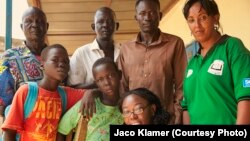The ongoing fighting in South Sudan has created far reaching consequences in providing humanitarian assistance and support for people in need.
The international confederation of NGO’s Light For The World said for security reasons, it was forced to suspend mapping areas where the eye disease, trachoma is widespread. In addition, Bor Hospital was totally destroyed – including an eye care wing they had established there.
The NGO said it will continue to stick to its 2015 goal and promise to provide services to persons with disabilities who live in regions of the world with ongoing conflicts such as South Sudan.
Despite these difficult and harsh circumstances one Nigeria born woman leads the way to support people with disabilities in the country.
Toyin Janet Aderemi, is a program manager for Light For The World. She oversees rehabilitation services for hundreds of children and adults with disabilities in South Sudan.
She knows exactly what it is like to live with a disability. Aderemi was left unable to walk due to polio in her childhood. She said her mother carried her on her back until she was 15 years old because at the time she did not have a wheelchair.
However, her disability has not let that stop her from helping others, especially refugees and Internally Displaced Persons, IDP’s with disabilities in South Sudan. She said “each and every refugee is very valuable. But refugees with a disability have an extra hard time, they have more difficulties getting access to facilities. Therefore they need our extra support.”
Aderemi pointed out that “people with disabilities are usually marginalized in any population. And in times of conflict and war and even natural disasters, what we see is that even this situation of marginalization gets worse. And this is our reason for attending to the needs and the concerns of people with disabilities who are displaced in South Sudan right now.”
Programs center around the theme of disabilities inclusion.
“We focus on intervention that can ensure that people with disabilities are also being reached by any type of services in those temporary displaced peoples’ camps. Specifically our intervention focuses on what we call the community based rehabilitation approach,” said the program manager.
A community based rehabilitation trained expert works in the camps with the people, identifying children and adults with disabilities. They are then assessed based on their disability and given the proper form of rehabilitation.
“We also provide access devices like wheelchairs… to those that need it. And apart from that, after we see that children for example are stabilized, we link them to the schools that serve those IDP camps,” said Aderemi who added they also collaborate with other international NGO’s who work in the camps to help provide access devices for those that need them.
The Light For The World program manager said providing support for people with disabilities is challenging and the biggest challenge she faces is the lack of access to funding.
“Donors don’t see people with disabilities a priority in emergency situations, which is not supposed to be, because conflict and war itself increases the number of people with disabilities. We have people who sustain injuries, people who get amputated… but we see is that it is very difficult to access funds. Another challenge that we also see is that most of the mainstream NGO’s that work in the camps don’t have any knowledge of how to make their services accessible to those with disabilities,” explained Aderemi.
However, Aderemi highlighted that because of their training they are able to approach the other NGO’s and show them what they could do to make their services more accessible.
Aderemi says that fact that she is a woman with a disability, a polio survivor and uses a wheelchair is an advantage for her in her work, “because when I talk to people for intervention they listen better because they know I also experience what it is and also I bring my experience on board as an intervention, for example if we need to modify some structures in the camp, I can say why don’t we do this, or it’s better that way.”




